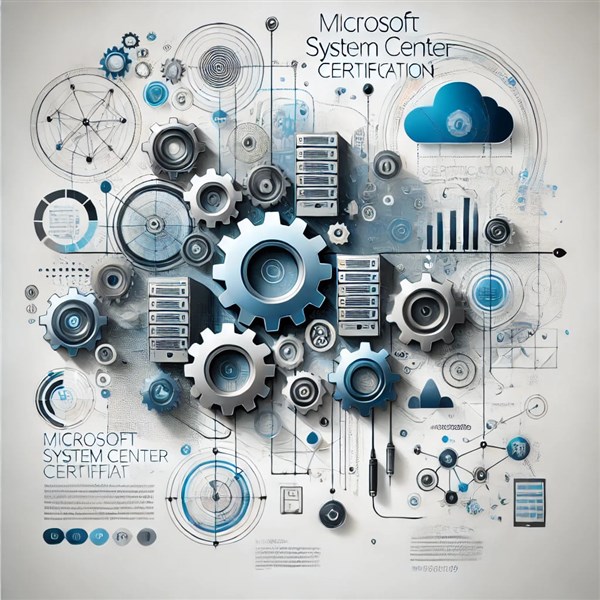
In the evolving world of information technology (IT), having the right skillset is crucial. For IT administrators, gaining a Microsoft System Center Certification is a significant step towards enhancing and validating those skills. This certification provides comprehensive knowledge about Microsoft System Center Configuration Manager (SCCM), and is considered a must-have for IT professionals in the field.
Microsoft System Center is a powerful platform that enables IT administrators to manage data centers, deploy applications, monitor infrastructure, and automate processes across diverse environments, including on-premises data centers and cloud-based services. Earning a Microsoft System Center certification equips IT professionals with the knowledge and skills necessary to leverage this suite effectively, ensuring that they can manage enterprise infrastructure efficiently and stay ahead in an ever-evolving technological landscape.
In this blog, we will explore why Microsoft System Center certification is essential for IT administrators and how it enables them to manage complex, enterprise-level environments with greater confidence, efficiency, and security.
Overview of Microsoft System Center
Microsoft System Center is a comprehensive suite of management tools designed to enable IT professionals to monitor, automate, configure, and optimize infrastructure. It includes several core components that allow IT administrators to manage different aspects of an organization’s IT systems:
- System Center Configuration Manager (SCCM): Automates the deployment of operating systems, software updates, and patches, while ensuring compliance across the organization.
- System Center Operations Manager (SCOM): Provides real-time monitoring of infrastructure, enabling administrators to detect and resolve issues before they impact the business.
- System Center Virtual Machine Manager (SCVMM): Allows for the management and optimization of virtualized environments, including private clouds and virtual machines.
- System Center Data Protection Manager (DPM): Ensures reliable data backups and recovery for critical business applications and services.
- System Center Orchestrator: Automates workflows and integrates systems across the enterprise, reducing manual tasks and improving efficiency.
Together, these tools offer a unified platform that simplifies infrastructure management, ensures compliance, and improves operational efficiency for IT administrators responsible for managing complex environments.
The Importance of Microsoft System Center Certification for IT Administrators
1. Mastery of Enterprise-Level Infrastructure Management
Managing an enterprise-level infrastructure involves overseeing multiple components such as servers, networks, storage systems, and applications. For IT administrators, keeping these systems functioning optimally is critical. Microsoft System Center certification provides IT professionals with a deep understanding of the platform’s capabilities, allowing them to master infrastructure management tasks such as:
- Automating operating system deployment and application updates across hundreds or thousands of devices using SCCM.
- Monitoring the health of servers, applications, and network components with SCOM, enabling proactive management of system performance.
- Managing virtual machines and cloud resources using SCVMM, ensuring that virtualized environments are optimized for performance and cost-efficiency.
- Implementing backup and disaster recovery solutions using DPM to protect business-critical data and ensure high availability.
By obtaining certification, IT administrators gain the expertise needed to handle these tasks efficiently, reducing the risk of downtime and ensuring that enterprise systems remain reliable and secure.
2. Increased Efficiency Through Automation
One of the greatest advantages of Microsoft System Center is its ability to automate routine and repetitive tasks, freeing up IT administrators to focus on more strategic initiatives. Automation can significantly reduce the time and effort required to manage complex infrastructures, improving operational efficiency.
- SCCM enables administrators to automate tasks such as patch management, software distribution, and system updates, ensuring that endpoints are always up to date without manual intervention.
- Orchestrator allows administrators to create automated workflows that streamline processes across different systems, reducing human error and increasing efficiency.
- SCVMM enables the automation of virtual machine provisioning, allowing administrators to quickly deploy and manage virtual environments as business needs evolve.
By earning a Microsoft System Center certification, IT administrators learn how to implement these automation capabilities effectively, reducing the time spent on routine tasks and improving the overall agility of IT operations.
3. Improved Monitoring and Proactive Problem Resolution
One of the key challenges IT administrators face is ensuring the continuous availability and performance of infrastructure components. Unexpected failures, system overloads, or resource bottlenecks can lead to downtime, which can have significant financial and operational impacts on a business.
System Center Operations Manager (SCOM) provides comprehensive monitoring capabilities that allow IT administrators to keep an eye on the health of servers, applications, networks, and other critical systems. SCOM offers real-time alerts and insights into the performance and availability of these components, enabling administrators to detect and resolve potential issues before they escalate into full-blown problems.
With Microsoft System Center certification, IT administrators gain a deep understanding of SCOM’s monitoring capabilities and learn how to set up and configure monitoring solutions tailored to their organization’s specific needs. This proactive approach to infrastructure management helps reduce downtime, improve system reliability, and ensure that IT services meet business demands.
4. Enhanced Security and Compliance Management
Security is a top priority for IT administrators, particularly when managing large enterprise environments that include sensitive data and mission-critical systems. Ensuring that these environments comply with security standards and regulations is an ongoing challenge.
Microsoft System Center provides several tools that can help administrators ensure security and compliance across the organization:
- SCCM includes capabilities for managing endpoint security, such as deploying security patches, ensuring that antivirus software is up to date, and enforcing compliance policies.
- DPM ensures that data is securely backed up and protected against loss, ransomware, or other cyber threats.
- Orchestrator can automate security processes such as monitoring for unusual activity or deploying security patches in response to threats.
By earning a Microsoft System Center certification, IT administrators gain the knowledge needed to implement security best practices and compliance policies across their organization. Certification ensures that they are equipped to handle the complexities of managing security in an enterprise environment, reducing the risk of data breaches and ensuring compliance with regulations such as GDPR, HIPAA, or PCI-DSS.
5. Streamlining Hybrid Cloud Management
With more organizations adopting hybrid cloud models—combining on-premises infrastructure with cloud-based services—IT administrators must manage both environments seamlessly. Microsoft System Center is well-suited for hybrid cloud environments, enabling administrators to manage both on-premises and cloud resources from a single platform.
System Center Virtual Machine Manager (SCVMM) allows administrators to manage virtual machines and private clouds on-premises, while also integrating with cloud services like Azure. This unified management approach helps administrators balance workloads, optimize resources, and ensure that both cloud and on-premises infrastructure are performing efficiently.
Certification in Microsoft System Center prepares IT administrators to manage these hybrid environments effectively. They learn how to integrate on-premises resources with cloud services, optimize performance across environments, and implement cloud-based disaster recovery solutions. This ensures that organizations can take advantage of the scalability and flexibility of the cloud while maintaining control over critical on-premises infrastructure.
6. Career Advancement and Recognition
In an IT landscape that is becoming increasingly complex, organizations are seeking professionals who possess the skills to manage and optimize their infrastructure. Earning a Microsoft System Center certification not only validates an IT administrator’s expertise in managing enterprise-level infrastructure but also increases their marketability in the job market.
Certification demonstrates a commitment to professional development and mastery of the latest tools and technologies in systems management. IT professionals who hold certifications are often considered for higher-level positions such as Systems Administrator, Infrastructure Manager, Cloud Architect, or IT Operations Manager. Additionally, certified professionals often enjoy higher salaries and greater career advancement opportunities compared to their non-certified peers.
Conclusion
As the demands on IT infrastructure continue to grow, Microsoft System Center has emerged as an essential platform for managing and optimizing enterprise-level environments. For IT administrators, earning a Microsoft System Center certification is critical to mastering the tools needed to manage servers, networks, storage, virtual environments, and cloud services efficiently.
Certification equips IT professionals with the skills needed to automate routine tasks, proactively monitor infrastructure, ensure security and compliance, and manage hybrid cloud environments seamlessly. As organizations increasingly rely on these capabilities to stay competitive, certified IT administrators will play a key role in ensuring that infrastructure operations run smoothly and meet business needs.
For IT administrators looking to advance their careers, improve their skills, and make a significant impact on their organization’s success, Microsoft System Center certification is an essential step in achieving those goals.
In conclusion, the Microsoft System Center Certification is an essential credential for IT administrators. Whether you choose an SCCM course, SCCM boot camp, or SCCM administrator Training, you are sure to enhance your skills and employability.
As a leading IT training company, Koenig Solutions provides certifications in top technology courses, including SCCM training and certification.







COMMENT